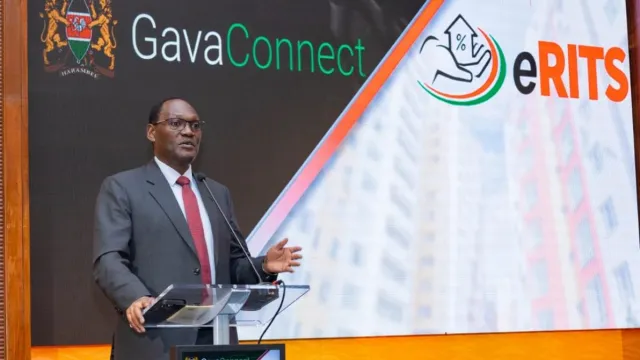KRA turns up the heat on rental tax evaders

The National Treasury Principal Secretary, Dr. Chris Kiptoo speaks during the launch of the Kenya Revenue Authority's Electronic Rental Income Tax System(eRITS).
The taxman has unveiled a new portal tailor-made for filing of rent income as the Kenya Revenue Authority aims at increasing revenue collections across the real estate industry.
In an update on Thursday, KRA said the Electronic Rental Income Tax System (eRITS) is poised to foster voluntary compliance among landlords and property owners. The system built on KRA’s Enterprise Integration Platform Gava Connect is set to streamline compliance for the real estate sector from a technology perspective, the taxman noted.
"With eRITS, we are moving towards a smarter, more efficient tax system that benefits everyone. With this system, we aim to not only increase revenue collection but also create a more equitable and predictable tax environment that benefits both taxpayers and the government,” explained Principal Secretary to The National Treasury, Dr. Chris Kiptoo during the unveil.
He noted that eRITS is a vital step in the government's push to ensure a fair and efficient tax system.
These remarks were echoed by the Housing Secretary of the State Department of Housing and Urban Development, Mr Athman Said who said that the real estate sector is now poised to be a major contributor to Kenya’s overall development through tax revenue.
According to KRA Commissioner General, Humphrey Wattanga, the system is a voluntary compliance tool that aims to support and enhance tax compliance among rental property owners and agents
"eRITS is designed to enable seamless integration with the KRA ecosystem for purposes of tax computation, filing, and payment; and is accessible through the Gava Connect API portal for system-to-system integration, and as a service through the eCitizen platform," noted Mr Wattanga.
"The intention is to augment voluntary compliance within the sector while reducing administrative burdens associated with taxation.”
Introduced in 2016, the Monthly Rental Income (MRI) is applicable to landlords earning between KE288,000 and KES15 million annually. The MRI tax rate was reduced from 10 percent to 7.5 percent, from 1st January 2024.
In the last financial year 2023/2024, tax revenues collected through MRI stood at KES14.4 billion, reflecting 5.2 percent increase compared to KES13.6 billion collected previously.





